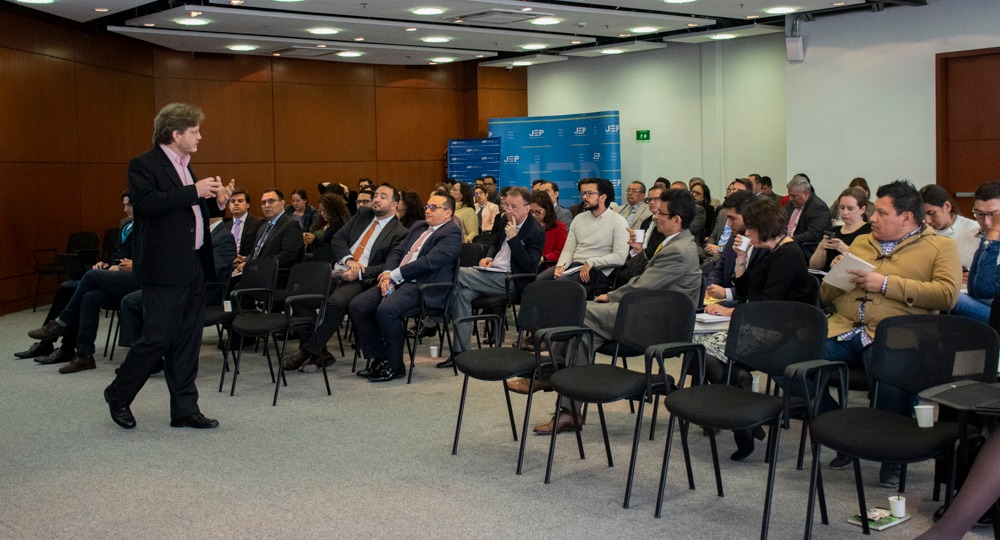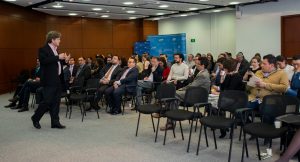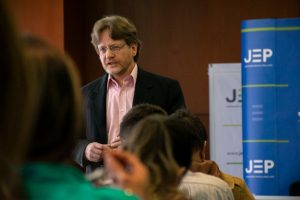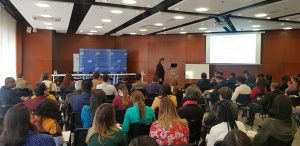
WORKSHOP ON INTERNATIONAL CRIMINAL LAW AND JEP
A workshop entitled “International Criminal Law and JEP“, organised by the German-Colombian Peace Institute – CAPAZ; the Centre for Latin American Criminal Law and Criminal Procedure Studies – CEDPAL, attached to the University of Göttingen; and the Special Jurisdiction for Peace – JEP, was held at the Special Peace Jurisdiction (JEP) in Bogotá, on Wednesday, May 29, 2019.
The workshop was one of the joint activities agreed upon by the three institutions, in the context of the cooperation agreement they recently signed at the CAPAZ Institute headquarters in Bogotá, during the visit of Heiko Maas, Federal Minister of Foreign Affairs of Germany.
You can read more about the visit of Maas in CAPAZ (in German).
The workshop was led by Prof. Dr. Kai Ambos, Director General of CEDPAL, representative of the University of Göttingen in the German-Colombian CAPAZ consortium, Amicus Curiae of the JEP, and Magistrate of the Special Court for Kosovo.
The event was organised by Auxiliary Magistrate Diego Tarapués of the Review Section of the Peace Tribunal and CEDPAL researcher. Almost a hundred civil servants of the JEP, especially Magistrates of the Peace Tribunal, Magistrates of the Chambers of Justice, Auxiliary Magistrates and Prosecutors of the Investigation and Prosecution Unit, discussed two topics during the day: (i) Command Responsibility, and (ii) Examination of Extradition Requests.
Command Responsibility
Prof. Kai Ambos gave a general presentation of the characteristic elements of this figure of attribution of criminal responsibility contained in Art. 28 of the Rome Statute (Responsibility of chiefs and other superiors).
He detailed the type of relationship that should exist between the superior and the subordinate and pointed out that Colombian guerrilla groups, tend to be more organised in this respect than many African countries.
He stressed the importance of considering not only the jurisprudence of the International Criminal Court (ICC) on the issue, which is basically reduced to the two judgments in the case of Jean-Pierre Bemba. For the jurist, it is necessary to analyse the developments reached by ad hoc criminal tribunals that are part of international criminal jurisprudence. In this sense, he emphasised the importance of case law in the development of command responsibility.
Professor Ambos further stressed the importance of inference in obtaining the subjective component in command responsibility and clarified that other statutes did not have a causal link clause, which only appears with the issuance of the Rome Statute. He also pointed out that, although there must be a causal link, this should not be understood as sine qua non causality in the strict sense of the word.
After making a general outline of the errors considered by the Appeals Chamber of the ICC in the second instance decision of the Bemba case, he critically analysed the sentence of the Criminal Cassation Chamber of the Supreme Court of Justice of Colombia of December 5, 2018, which deals with the possible use of the figure of Command Responsibility in the Colombian criminal justice system.
In his critical reading of the judgement, Professor Ambos stresses that the nature of the figure is not clarified in the judgement, but is sometimes treated as a “form of participation” and in other parts of providence as an “author”. He also questions that the requirement of knowledge is taken as fraud and that the “causal relationship” is confused with the expression “facilitate” commission and increase risk.
You may be interested: Seminario (workshop) sobre la Ley de procedimiento de la Jurisdicción Especial para la Paz (JEP) en la Pontificia Universidad Javeriana en Bogotá (mayo 27 y 28 de 2019) (in Spanish)
Examination of Extradition Requests
In relation to the second theme of the workshop, Prof. Kai Ambos presented the generalities of the traditional extradition regime. He clarified the scope of the principles of double incrimination and reciprocity (do ut des), as well as the existing normative obstacles (for example, the case of political crimes). Through examples, he shared the German experience in extradition, not only of this mechanism of international judicial cooperation, but also of the so-called European Arrest Warrant (EAW), in accordance with the Council Framework Decision on the European arrest warrant and the surrender procedures between Member States of 2002.
He presented important reflections for the unique work of the Peace Tribunal, especially for the Review and Appeals Sections, on the guarantee of non-extradition and the standard of proof in foreign and comparative law. He exemplified the intensity of the examination of an extradition request in view of the German Act on International Judicial Assistance in Criminal Matters.
For the ordinary extradition of foreigners, in view of the constitutional prohibition on extraditing Germans themselves, the law requires that extradition be “admitted only if the facts on which sufficient suspicion is based are indicated” and “if the extradition documents are not sufficient to determine the admissibility of the extradition, the Land High Court shall make a decision only after the requesting State has been given the opportunity to submit additional documents”, being able to “set a time limit for the submission of such documents” and with the possibility of “obtaining additional evidence concerning the admissibility of the extradition”.
Kai Ambos also explained how in the surrender procedure, within the framework of a EAW where there is a higher level of trust and integration between the member states of this Community instrument, it is possible to request (urgently) complementary information necessary to continue with the surrender procedure; and that sometimes the documentation presented by the requesting State is not enough.
The questions posed by the workshop participants focused on inquiring into dogmatic clarifications on issues related to authorship, participation, and command responsibility, as well as practical concerns about specific cases resolved by German judicial authorities, extradition cases and requests for surrender under the EAW.
This is the second workshop after the first academic meeting of this kind in November 2018. The recent exercise served to generate a productive legal discussion on issues of international criminal law, foreign criminal law, and comparative law, with references and analysis of the jurisprudential developments generated by the jurisdictional bodies of the JEP. These academic spaces contribute to the strengthening of the analytical capacities of t JEP staff through dialogues that foster the transfer of knowledge and academic cooperation.
(Text: Diego F. Tarapués Sandino. Revision: Claudia Maya. English version: Tiziana Laudato).






